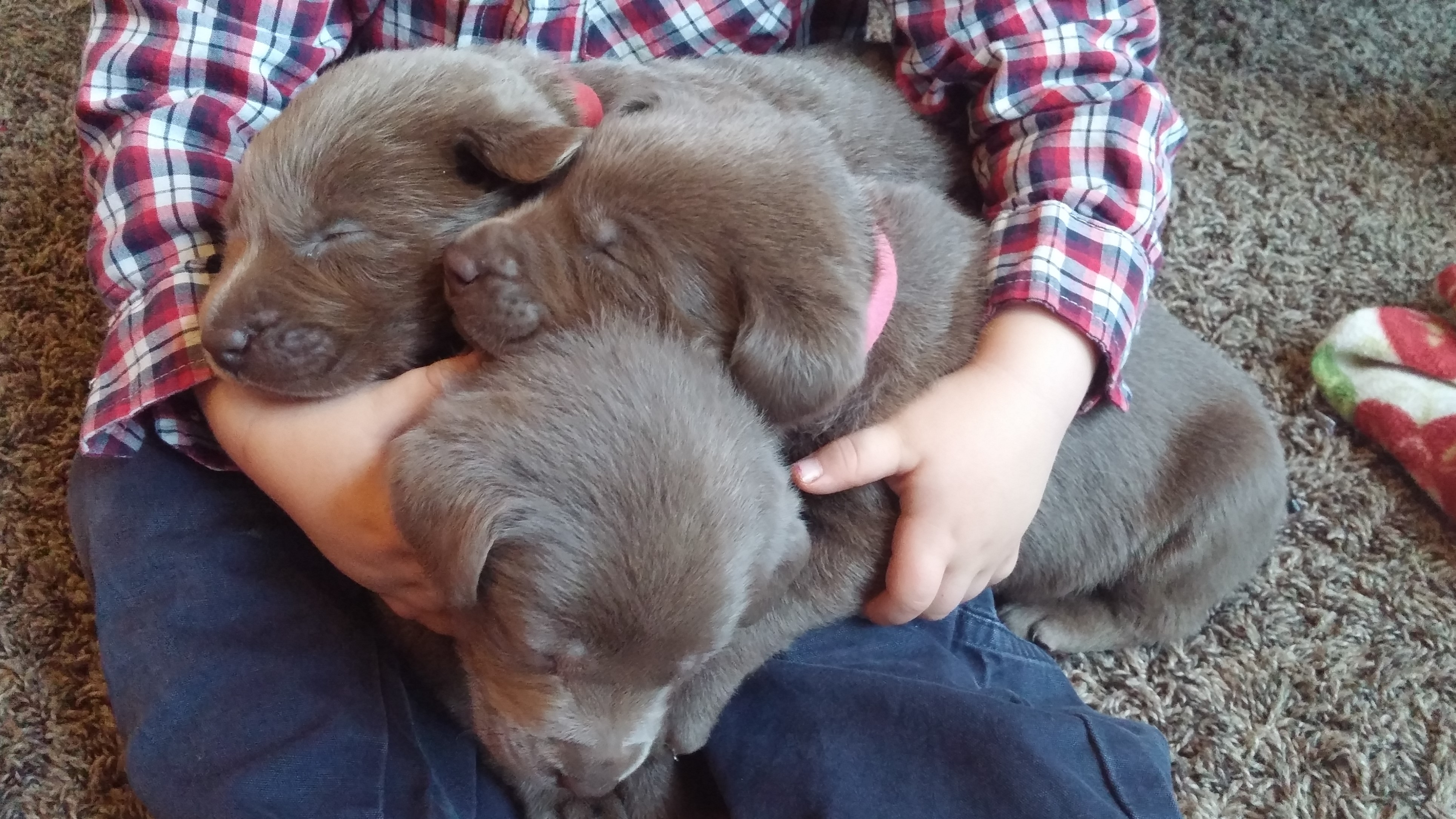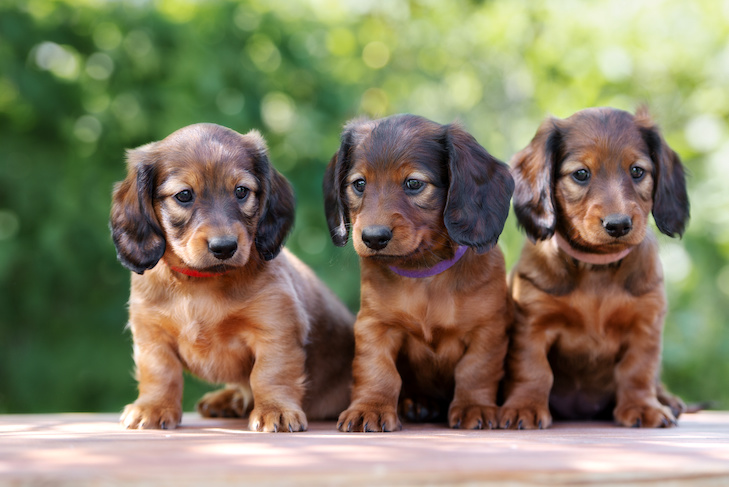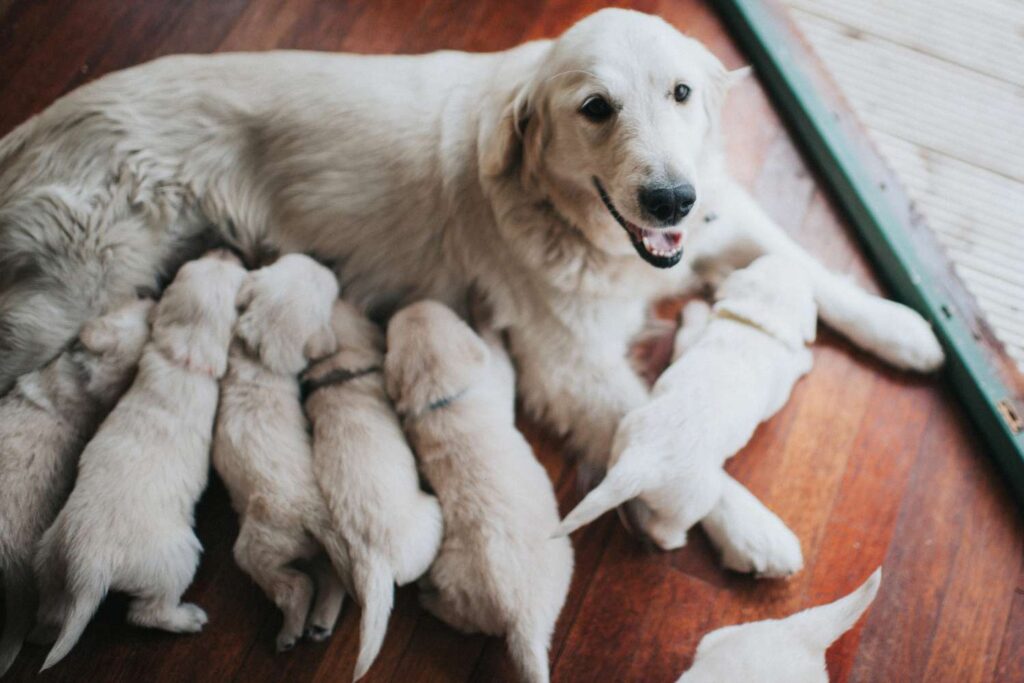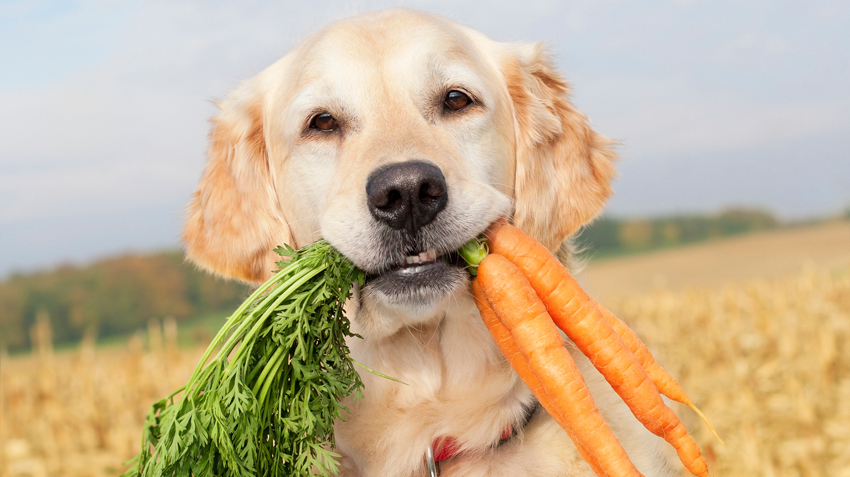The few things to understand before choosing the right puppy for you is breed characteristics, the best adoption locations, and the puppy stage experience. After you have a good feel for these, then knowing different puppy personality tests can help you pick the exact puppy to bring fulfillment and satisfaction for you life.
Breed:
Picking the right dog for you is more than just finding a cute puppy that warms your heart. Just like some people thrive in the city while others feel claustrophic, dogs have their own personalities and certain situations they are best suited for them. A large dog in a little apartment can be happy if given enough daily walks and attention, but that same dog will really thrive and glow if given a large yard to run around daily. A protective, little dog will attach and bond with a single person, but may be overwhelmed in a family with a lot of children. Researching which breed fits your situation will help you and your future canine be happy.
When thinking about the right breed, think about your home. Do you have a large yard? Do you like to take a companion with you for a run or walk every day? Don’t try to fool yourself into thinking you will suddenly start to enjoy running or walking every day after you get the dog. What do you enjoy doing now?
Think about your family. Do you live alone or have small children? Do you like to travel? Are you gone for long stretches of time where the dog will be alone or will the dog be included in almost all of your activities away from home? Some dogs really feel apprehensive and can become destructive if left without social interaction for long periods of time while others dogs really don’t seem to mind the quiet for a while.
Here are some recommendations given by the American Kennel Club:
Apartment dwellers may want to consider adopting a Bulldog, Shih Tzu, Maltese, or Pug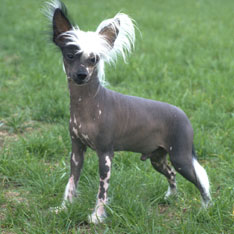
A family should consider adopting a Labrador Retriever, Golden Retriever, Beagle, or Collie
If you want a guard dog perhaps consider adopting a Doberman Pinscher, Rottweiler, German Shepherd, or Rhodesian Ridgeback
For a good children’s dog consider adopting a Golden Retriever, Labrador Retriever, Newfoundland, or Bulldog
If you need a hypoallergenic dog consider adopting a Poodle, Maltese, Irish Water Spaniel, or Bichon Frise
Especially smart dogs, easy to train, look at adopting a Golden Retriever, Poodle, German Shepherd, or Labrador Retriever
To find a completely hairless dog consider adopting a Peruvian Inca Orchid or American Hairless Terrier
After evaluating your lifestyle and family situation, if you are still unsure about which breed is the right one for you then you may want to visit the AKC breed selector test to help you narrow the choices. Whatever you decide, you want a dog that will be a forever companion and not a temporary resident. Puppies are not a rent-to-own possession where you can just return the merchandise if it doesn’t match up to your expectations. Therefore, take time to figure out your match first and commit before purchase.
Adoption:
The next question to consider is where to adopt your new companion. After all the trouble of selecting the right breed, you want to be sure you really get that breed when you pick up the puppy. A vendor in front of the grocery store may reassure you the puppies are pure-bred, but without the paperwork or at least viewing the parents you may never know. Some “luxury mixes” such as the Golden-doodle will not come with registration papers, but there are still a few things to be aware of that can help to guarantee aren’t just getting a mutt.
- Visit the place where you are adopting the puppy, if possible, and ask to see the parents. Are the puppies given plenty of room to run and develop? Are the parents friendly and well taken care of?
- Some breeders will include a contract of your responsibilities, health guarantees, and refund options. Are the registration papers, limited or full, available upon purchase? You should never need to wait for the registration papers to be mailed to you after purchase. Chances are they will never arrive.
- Read the customer reviews. If the breeder’s website doesn’t have any reviews, ask the breeder for some phone numbers of previous customers. All breeders are required by the AKC to keep a record of puppy ownerships, present and past.
- Upon purchase, ask for a copy of the immunizations the puppy has received. Some breeders like to give their own shots while others will have a vet give the shots. Either way, there should be a record available to make sure the puppy is up-to-date on necessary vaccines.
- Ask what the puppy has been fed and request a transition bag when you take the puppy home. If switching to a different food once the puppy is home, give a little of both kinds to transition the puppy and prevent nausea. A puppy started on healthy, not cheap, food is always better. A simple rule of thumb is that healthy dog food will cost at least $1 or more per pound.
Breeders are found at the AKC Marketplace site as well as other sites such as Puppy Finder or Good Dog. There are three main types of breeders or places to buy puppies. Each one has a different approach and value, depending on what you are searching for in a puppy.
Licensed breeders generally have their own website with pictures, history, and descriptions. Health screenings will have been done on the parents before breeding and a health guarantee will be included with each puppy purchase. These puppies often cost the most, but the investment is worth the assurance you are getting a healthy dog. Every breed has certain health concerns associated with them, but a good licensed breeder will test for these and not breed any dog that has these problems. Licensed breeders have gone the extra step to obtain a license to breed puppies regularly at their residence. This means they have more land (generally 2-5 acres or more) for the puppies to roam, approval of the city they live in, and consent from their neighbors. A licensed breeder is one of the most reliable sources for purchasing a purebred dog. They have done the research and have the experience to provide the best care as well as advice for a new owner. One thing to be aware of and cautious is a breeder that has several dogs, perhaps even several breeds, and they are all locked away in separate kennels all day. A kenneled dog that never gets a chance to run is a not a good situation and you want to avoid any breeder, no matter their license or not, that does not accurately care for their dogs.
Hobby breeders often provide quality puppies as well and are sometimes less expensive than the licensed breeder. Hobby breeders come in many varieties. Most are breeding because they love their dogs, which is how it should be, and allow their dogs plenty of exercise and attention. These are the breeders you want to find. They don’t have the required license to breed large numbers of dogs, nor the extra land for the dogs to roam, but they are still a great source to find a puppy. Some hobby breeders go through the recommended health screenings and provide health guarantees, while some do not. Some have their own website, some do not. You will want to ask questions about their care and visit the home, if possible. As with licensed breeders, make sure the dogs are not just kenneled and forgotten. A good puppy is one that is given daily attention and opportunity to explore.
Shelter and rescue dogs are the final option for most puppy purchases. They are the least expensive, although you will often be required to pay for the neuter or spay upfront as well. These dogs might come from neglected or abusive situations, and really need a good home. The downside with them is that nobody really knows their background. Many of them are found wandering the street or brought in from an unhappy home. Once in a while there will be puppies, but more likely there will only be adult dogs with habits already set. These dogs deserve another chance. However, you shouldn’t just make a quick purchase and bring one home. Spend lots of time with them first. Let the shelter or rescue facility know the kind of dog you are searching for and your current living condition. Then visit several times. Take the dog for walks, play outings, and long talks. See how the dog reacts to your personality and how receptive you are of each other. Listen to your gut feelings. If there is more than just you that will be part of the dog’s new life, bring the others with you as often as possible. The dog should be just as comfortable as the people are with the new arrangement. Ask for whatever records and information are available with the realization that there are no guarantees. Even the breed is often a guess. Yet, if you can truly be the success in a rescue dog’s life, you will join the ranks of unsung everyday heroes.
Be honest with yourself and make real commitments. Whichever location you choose to adopt your puppy from, take your time to pick the right one. Adoption is for keeps!
Puppy Stage
The first year of a puppy’s life is the hardest with all the learning and adjustments and growth. Don’t give up on a puppy just because there is some chewing, accidents, and barking. This is normal. The puppy will grow out of it. The puppy will grow up. The puppy can develop into an amazing companion if you offer the  teaching and patience necessary.
teaching and patience necessary.
The puppy stage is also the best stage. It is so fun! Everything is new and exciting for a puppy. Bring a puppy into a room and suddenly there are smiles and laughter. They are developing and learning quickly at this moment of time.
When you start to feel frustrated with the training and mess of a new puppy, try to remember the fun moments too. Give the puppy time to grow up. Help the puppy socialize and learn life skills. You can help make a big difference to the kind of dog the puppy will eventually become by how to treat the puppy now.
A crate is good to use too. When you are unable to watch the puppy or just need a break, let the puppy stay in the crate. You can place a chew toy inside to distract and help the puppy bide the time. However, try not to leave the puppy inside the crate all the time. Spend time together, helping the puppy learn about you and how he will fit into your family.
Adjustment from toddler stage, or puppy stage, to adult dog is only about three years. This is a relatively short time. The first year is the hardest, so don’t give up. You didn’t choose the wrong puppy just because this one is chewing or jumping all the time. All of this is normal. Investing in a good training class can help. Offering lots of exercise play time makes a tremendous difference as well. Before you lock the puppy in a crate, exercise him and give him time to use the bathroom. Then the puppy will be tired and will enjoy the quiet time alone.
If you enjoy puppies, another thing that will help during this stage is to get a second puppy. Especially if you plan to eventually have two or more dogs, it is good to start them together as puppies. They will grow up best friends. They will still enjoy time with you, but they will instantly have a wrestling companion and another playmate. Then you can sit back and watch them. They can enjoy play-time even while you are busy.
In the end, remember that puppy stage is only temporary. Enjoy the time. Use the time to help them adjust and socialize. Most importantly, don’t give up. The puppy will grow into the wonderful companion of the breed you selected at the beginning. Learn more tips about socializing here.
Personality Tests:
All puppies have a unique personality, no matter which breed. There is no bad personality. There are just personalities that fit better with different situations. Their are quiet personalities and loud, aggressive personalities. There are no wrong personalities. Certain breeds will tend to be more one way than another, but even within litters there will be a variety of diverse characteristics. Here are a few simple tests you can do when picking a puppy on-site. A puppy should be at least four weeks old before doing these tests.
Test 1: Hold the puppy to your face. Does the puppy lick you and start playing with you? This is the most important test as it shows that your puppy has a natural affection and attraction to you. No matter how they score on the other tests, this one matters the most. You want a puppy that naturally wants you too.
Test 2: Compare weights in the litter. The fat, chubby puppies are the ones that fought their way to the top of the litter to reach the food. They gained the weight when the less dominant puppy waited politely for a turn. These are your alpha or leader dogs. They will either be attentive and eager to gain attention or they will be lazy. The lazy ones are great for cuddles and make awesome pets. The more eager ones usually take quickly to training and are often chosen for police detective work, hunting, or guard dogs. However, pay close attention especially to the runts as well. They are often the most popular. They have learned endurance, patience and are usually quick to train. They are not lazy dogs. Runts are often chosen as therapy service dogs, hunting, and as playmates for little kids that think they are the cutest. Without fail, I have always seen a child under six pick up the runt first and beg to keep that one. As a result, the runts usually get the most attention and are the most socialize of the litter.
Test 3: Gently roll the puppy onto his back and rub his tummy. Does the puppy let you rub or does the puppy wiggle immediately and try to get away? The puppy that stays and lets you rub is more submissive and may tend to be more interactive. They are ideal family pets and service dogs. They will also be the easiest to train for any other activity such as hunting, trick commands, and basic obedience. Being more submissive, they recognize you as the leader and want to please you. They will want to follow your directions and try everything to make you happy. This dog will be less aggressive and more easily adjusted when taken home. They just want to be with you.
Test 4: Drop keys or other loud objects behind the puppy. Does the puppy startle easily? This may show greater sensitivity and sometimes more fear. They will need more socialization to overcome fears. These are ideal guards, whether for your home or business. They are hyper-aware of their surroundings and a little distrustful of them. They also will make good family pets, but they should not be left alone for long periods of time as their natural fears make increase and manifest themselves in destructive ways. Early training and socialization are extremely important for a shy puppy. They need to be shown that the world is not scary and that they have a place to fit inside it. A shy, easily startled dog, should be one that is adopted and included with a social group. They will tend to bond deeply with their family and will always be ready in defending them. All dogs should have a forever family, but especially shy dogs have a harder time adjusting to someplace new.
Test 5: Put the puppy alone in the center of the room and walk away. Does the puppy follow? This shows an attachment to people and possibly you in particular. They want to be near you and that is a wonderful sign. However, this can be the most difficult and unreliable of tests. With so many distractions, a puppy may easily wander off to explore. This simply means the puppy is curious and isn’t a negative reflection on you. If this happens, get closer to the puppy and try again. Wiggly your fingers on the floor in front of the puppy. When he notices you, call again and smile. The puppy will probably come running. If the puppy continues to show disregard or lack of interest in you, don’t take it personal. Check out the other puppies in the litter for your perfect match.
All of these tests, however, cannot entirely predict how your puppy will grow up. Each puppy will need socialization and training. If you are not able to visit the puppies onsite, ask the breeder for information about the puppy personalities. A good breeder will be interacting with the puppies a few times every 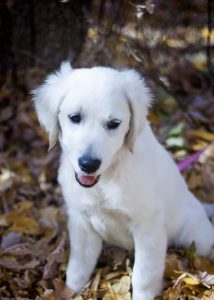 day and will know them well. Be sure to let the breeder know what role the puppy will have in the new home. Breeders can usually identify fairly quickly which dogs are the friendliest, most aggressive, and favorites. They can help you select a dog for service, hunting, a single person, or family. Trust their observations and recommendations. Pictures just don’t tell the full story.
day and will know them well. Be sure to let the breeder know what role the puppy will have in the new home. Breeders can usually identify fairly quickly which dogs are the friendliest, most aggressive, and favorites. They can help you select a dog for service, hunting, a single person, or family. Trust their observations and recommendations. Pictures just don’t tell the full story.
Whichever puppy you do select, train and love her. The puppy will love you in return. Before long, you will have an amazing companion and life-long friend.
Read more about our beautiful English Cream Golden Retrievers here. They are intelligent, loveable dogs that do great inside or outside, with a family or with a single person. They are quieter and calmer than many other breeds and are very versatile. If you have more questions, just text me at 801-602-6462.
